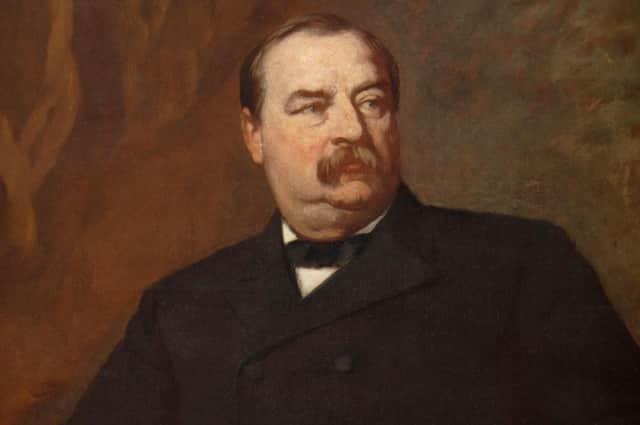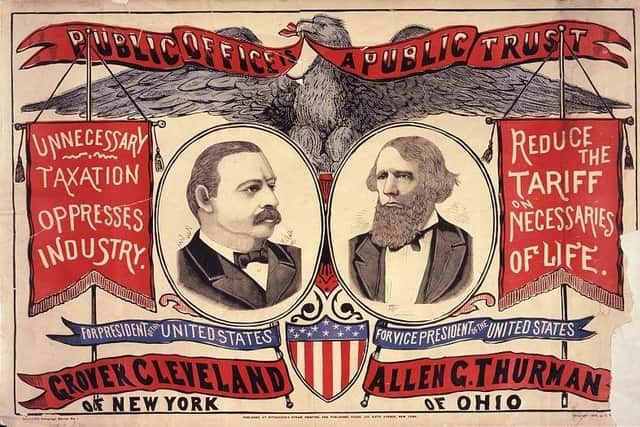Gordon Lucy: Ulster-Scot Grover Cleveland had well-earned reputation as America's ‘Veto President’


Grover Cleveland was an Ulster-Scot. Aber Neal, his maternal grandfather, emigrated to America from Co Antrim in the late 18th century.
Anne, his daughter, married the Rev Richard Falley Cleveland, a Presbyterian minister. Grover Cleveland, one of their nine children, was born in New Jersey in 1837. Raised in upstate New York, he became a lawyer in Buffalo and in 1881-2 served as mayor. In 1883 he became governor of New York. A workaholic, one journalist observed: ‘Governor Cleveland remains indoors constantly, eats and works, eats and works and works and eats.’
Advertisement
Hide AdAdvertisement
Hide AdHis reputation for bipartisanship, integrity and trustworthiness were the chief factors in his successful bid for the White House in 1884. His campaign slogan – in which he genuinely believed – was ‘Public Office is a Public Trust’.


In 1886 Cleveland, the 49-year-old bachelor president, married Frances Folsom, the daughter of his former law partner. Mrs Cleveland, 27 years younger than her husband, proved to be a very popular first lady.
Cleveland’s first term met with broad approval. His focus was on civil service reform, tariff reform and curtailing the expansion of the federal government.
With respect to the third point, he went through Congressional legislation with a fine-tooth comb to identify things he should veto. In his first term he issued 413 vetos, more than twice the number issued by his 21 presidential predecessors combined, an astonishing statistic.
Advertisement
Hide AdAdvertisement
Hide AdCleveland vigorously pursued a policy barring special favours to any economic group. For example, he vetoed a bill to appropriate $10,000 to distribute seed grain among drought-stricken farmers in Texas, many private pension bills to Civil War veterans whose claims were fraudulent and when Congress, pressured by the Grand Army of the Republic, passed a bill granting pensions for disabilities not caused by military service, he vetoed it, too.
Unsurprisingly, he was called the ‘Veto President’, giving rise to a children’s song: ‘A fat man once sat in the President’s chair, singing Ve-to, Ve-to,/ With never a thought of trouble or care, singing Ve-to, Ve-to.’
He infuriated the railroads by ordering an investigation of western lands they held by government grant. He forced them to return 81,000,000 acres. He also signed the Interstate Commerce Act, the first law attempting Federal regulation of the railroads.
In December 1887 he called on Congress to reduce high protective tariffs. Told that he had given Republicans an effective issue for the campaign of 1888, his replied: ‘What is the use of being elected or re-elected unless you stand for something?’
Advertisement
Hide AdAdvertisement
Hide AdOn election day in 1888, Cleveland won 100,000 more popular votes than Benjamin Harrison, his Republican rival, evidence of the esteem in which the president was held and to the widespread desire for a lower tariff. Yet Harrison won the election by securing a majority in the Electoral College (233 to 168).
Cleveland claimed there was ‘no happier man in the United States’ when he left the White House.
However, his wife was confident that he would return.
She told a White House servant: ‘Now Jerry, I want you to take good care of all the furniture and ornaments in the house, and not let any of them get lost or broken, for I want to find everything just as it is now, when we come back again.’
To which the servant replied: ‘Excuse meh, Mis’ Cleveland when does you-all expec’ to come back please – so I can have everything ready, I mean?’
Advertisement
Hide AdAdvertisement
Hide AdMrs Cleveland replied: ‘We are coming back just four years from today.’
And astonishingly she was right.
In 1892, Cleveland was confronted by a severe depression. Rightly or wrongly, he focused on the Treasury crisis rather than on business failures, farm mortgage foreclosures, and unemployment. He obtained repeal of the mildly inflationary Sherman Silver Purchase Act and, with the aid of Wall Street, maintained the Treasury’s gold reserve.
When railroad strikers in Chicago violated an injunction, Cleveland sent Federal troops to enforce it.
His policies during the depression were generally unpopular and chimed more closely with those of the Republicans than his own party. The Democrats ditched him and nominated William Jennings Bryan in 1896 who went down to defeat by William McKinley, another Ulster-Scot with Co Antrim antecedents.
Advertisement
Hide AdAdvertisement
Hide AdUnlike Benjamin Harrison and William McKinley, Cleveland had no ‘imperialist’ instincts. He did not proceed with Harrison’s proposal to annexe Hawaii, and he remained strictly neutral in the conflict between Cuba and Spain. This could be viewed as the logical extension of his fiscal conservatism. In 1895 he assisted in resolving a boundary dispute between Venezuela and the UK.
Although unpopular when he left the White House in 1897, he retired to Princeton, New Jersey, and regained much of the public admiration he had earlier enjoyed because he represented honesty and integrity during the ‘Gilded Age’ when many would contend those qualities appeared to be in short supply. Furthermore, many of his vetoes were seen to be perfectly justifiable.
Cleveland was the only Democrat to have been elected to the White House between James Buchanan, the 15th president, and Woodrow Wilson, the 28th president.
Therefore, to observe that Cleveland was the most conservative Democrat to have occupied the White House since the Civil War is scarcely an earth-shattering pronouncement, but the party would never again select a presidential nominee as sympathetic to business and as favourably disposed to limited government.
Advertisement
Hide AdAdvertisement
Hide AdSince his death in June 1908 Cleveland’s presidency has undergone periodic re-evaluation. In 1932 Cleveland was praised for his honesty and forthrightness. In 1948 and 1962 historians ranked him as ‘nearly great’.
More recently he has been regarded as ‘average’. His shortcomings have been identified as a lack of imagination, a failure to comprehend an era of rapid change and an inability to understand mass misery but these ought to be weighed against his undeniable probity. In the stock market of historical reputations, his stock will undoubtedly rise again.